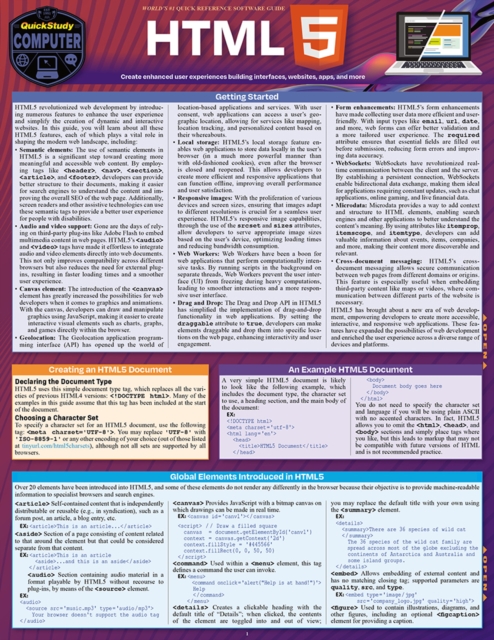
HTML 5 : a QuickStudy Reference Guide PDF
by Robin Nixon
Description
Essential HTML 5 reference to functions for creating enhanced user experiences building interfaces, websites, apps, and more. This six page reference guide is filled with succinct HTML 5 function explanations and example code in a format to fit as many functions with examples as possible. Author Robin Nixon has worked with computers since the 80s and has written over 40 programming books and over 500 articles for top computer magazines, also working for a prominent UK IT magazine publisher. With his expertise in the field and writing to his audience, combined with the famous QuickStudy format, this reference has more actionable items per page than any book or website. Whether you need a handy reference as a pro or you are a student, this inexpensive tool is a best-seller and proven to help.
6 page reference guide includes:
- Breakdown of HTML 5 Features
- Creating an HTML5 Document
- The Following Sections Include Example Code
- Example HTML5 Document
- Global Elements Introduced in HTML5
- Responsive Images
- Global Attributes Introduced in HTML5
- HTML5 Forms & Microdata
- Form Elements
- Form Attributes
- Form Input Types
- Microdata
- Features Removed in HTML5
- Graphics & Multimedia
- Audio & Video
- Math Markup Language (MathML)
- Scalable Vector Graphics (SVG)
- Programming
- The <canvas> Element
- Cross-Document Messaging
- WebSockets
- Event Handling
- Geolocation
- Local Storage
- Offline Web Applications
- WebSockets
- Web Workers
Information
-
Download - Immediately Available
- Format:PDF
- Publisher:BarCharts, Inc.
- Publication Date:01/11/2023
- Category:
- ISBN:9781423250715
Information
-
Download - Immediately Available
- Format:PDF
- Publisher:BarCharts, Inc.
- Publication Date:01/11/2023
- Category:
- ISBN:9781423250715






